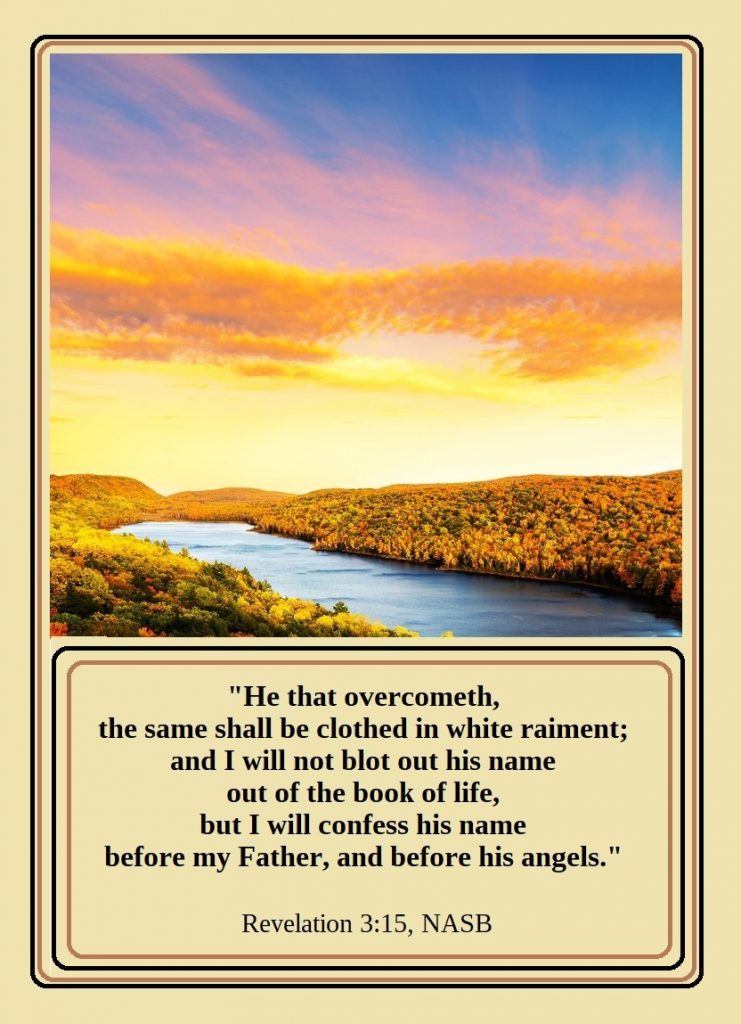“Go therefore and make disciples of all the nations…teaching them to observe all that I commanded you; and lo, I am with you always, even to the end of the age” (Matthew 28:19-20, NASB).
——————–
Contents:
1) The Lamb’s Book of Life (Cecil Willis)
2) Sword Tips #30 (Joe R. Price)
——————–

-1-
The Lamb’s Book of Life
Cecil Willis
One of the very beautiful expressions to me found in God’s Word is the reference to “The Lamb’s book of life” (Rev. 21:27). The allusion is to the practice of enrolling all the citizens of a particular city upon a register, indicating that person is a citizen and entitled to all the rights and privileges of citizenship. When a person died, or did some dishonorable thing, his name was blotted from the roll. From this custom, the lessons about the Lamb’s book of life are taken.
(1) There is such a record kept. The prophet Daniel indicated that such a book was kept: “and at that time thy people shall be delivered, every one that shall be found written in the book” (Dan. 12:1). In Rev. 13:8, John speaks of those who “make war with the saints” as being those “whose name hath not been written from the foundation of the world in the book of life of the Lamb that hath been slain.” Paul spoke of his fellow workers as those “whose names are in the book of life” (Phil. 4:3).
(2) This roll is an infallible record. Inasmuch as this is the roll of the Lamb, surely the record is infallibly kept. Jesus is described in Revelation as one whose “eyes were as a flame of fire,” which probably alludes to his omniscience. The Lord is said to know “what was in man” (Jno. 2:25). He knows the hearts of all men (Acts 1:24). Indeed, “there is no creature that is not manifest in his sight: but all things are naked and laid open before the eyes of him with whom we have to do” (Heb. 4:13).
Hence, it follows that the Lord knows those who are his own. His people are a people for his own possession (Tit. 2:14). He loved his own (Jno. 13:1), and he knows those who are his own (Jno. 10:14). The Bible teaches that the Lord adds to his church daily those that are being saved (Acts 2:47). He does not add the names of any whose name should not be enrolled, nor does he fail to add the name of one whose name should he enrolled. Men sometimes keep church rolls, but their record keeping is not infallible. Man may add the name of some insincere person, or unrighteous men may strike from the church roll the name of some righteous saint of God. However, the authentic and infallible roll is kept in heaven. Jesus told the returning seventy, “Nevertheless in this rejoice not, that the spirits are subject to you; but rejoice that your names are written in heaven” (Lk. 10:20).
(3) The names of the Old Testament worthies were written there. Apparently from the beginning, God has kept a heavenly record of those who faithfully served Him. On one occasion when Israel had sinned grievously, Moses sought to intercede with God for them. Moses even sought to exchange himself for his sinning people. He pleaded with God: “Yet now, if thou wilt forgive their sin –; and if not, blot me, I pray thee, out of thy book which thou hast written. And Jehovah said unto Moses, Whosoever hath sinned against me, him will I blot out of my book” (Ex. 32:32, 33). The ancient heroes of faith, such as those listed in Hebrews 11, were enrolled in the book of life.
(4) The names of Christians are written there. Again I refer to Phil. 4:3 where Paul stated that the names of his fellow-laborers “are in the book of life.” The Hebrew writer refers to the “general assembly and church of the firstborn who are enrolled in heaven” (Heb. 12:23). Only members of the church have their names written in heaven. If a person can be saved outside the church, he can be saved without having his name written in heaven. If one can be saved without being a member of the church, he can be saved without Jesus acknowledging him before the Father (Lk. 12:8, 9).
(5) If one’s name is not written there, he is lost. In the judgment scene in heaven, John saw that one’s name must be found in the book of life in order to be saved eternally. John stated, “I saw the dead, the great and the small, standing before the throne; and books were opened: and another book was opened, which is the book of life: and the dead were judged out of the things which were written in the books, according to their works” (Rev. 20:12). John stated also that the destruction of the beast would cause wonderment on the part of those “whose names hath not been written in the book of life from the foundation of the world” (Rev. 17:8). In order to show categorically the absolute essentiality of having one’s name in the Lamb’s book of life, John said, “And if any was not found written in the book of life, he was cast into the lake of fire” (Rev. 20:15).
(6) One’s name may be blotted out. Some try to use the fact that there is a heavenly book of life to prove the impossibility of apostasy. Albert Barnes, for example, said, “Names that are written in the book of life will not be blotted out.” Matthew Henry agreed, “But they whose names are written in heaven shall never perish.” It is true that man cannot blot your name from the Lamb’s book of life, but the Lamb can do so.
Moses realized that God could remove his name from his roll book when he asked to be blotted out (Ex. 32:32). Speaking of some who had become adversaries of God’s people, David said, “Let them be blotted out of the book of life, and not be written with the righteous” (Ps. 69:28). Obviously one’s name could not be blotted from the book of life if his name had never been written there. Thus the possibility of having one’s name blotted out shows without doubt the possibility of apostasy.
In the church at Sardis, there were some who had not defiled their garments. Of these, Jesus said: “He that overcometh shall thus be arrayed in white garments; and I will in no wise blot his name out of the book of life, and I will confess his name before my Father, and before his angels” (Rev. 3:5).
Conclusion: John spoke of the heavenly city, and who shall enter it. “And there shall in no wise enter into it anything unclean, or he that maketh an abomination and a lie: but only they that are written in the Lamb’s book of life” (Rev. 21:27). You need to ask yourself the question we often ask in song: “Is my name written there, on the page white and fair? In the book of Thy kingdom, is my name written there?” If not friend, you need to obey the gospel that you might be added by Christ to His kingdom, for only those in the church are enrolled in heaven.
— Via Truth Magazine, XVI: 11, pp. 3-5, January 20, 1972
https://www.truthmagazine.com/archives/volume16/TM016163.html
——————–

-2-
“And take…the sword of the Spirit, which is the word of God” (Eph. 6:17).
Sword Tips #30
Joe R. Price
“Here is wisdom. Let him who has understanding calculate the number of the beast, for it is the number of a man: His number is 666.” (Revelation 13:18)
There are many fanciful and false interpretations of the book of Revelation, including the infamous “number of the beast,” 666.
Wisdom teaches us it signifies failure, upon failure, upon failure, as it thrice falls short of the perfect number “7.” Worldly forces that oppose God’s truth and God’s people will ultimately fail.
The Revelation assures Christians of victory in Jesus in the face of overwhelming odds.
Do not be dismayed or discouraged by the forces of evil that rise up and press against you in this world.
Be steadfast in your faith; “the Lamb will overcome them” (Rev. 17:14).
——————–
Psalm 37:3
“Trust in the LORD and do good;
Dwell in the land and cultivate faithfulness.”
— NASB
——————–
The Steps That Lead to Eternal Salvation
1) Hear the gospel — for that is how faith comes (Rom. 10:17; John 20:30-31).
2) Believe in the deity of Jesus Christ, the Son of God (John 8:24; John 3:18).
3) Repent of sins. For every accountable person has sinned (Romans 3:23; Romans 3:10), which causes one to be spiritually dead (Ephesians 2:1) and separated from God (Isaiah 59:1-2; Romans 6:23). Therefore, repentance of sin is necessary (Luke 13:5; Acts 17:30). For whether the sin seems great or small, there will still be the same penalty for either (Matt. 12:36-37; 2 Cor. 5:10) — and even for a lie (Rev. 21:8).
4) Confess faith in Christ (Rom. 10:9-10; Acts 8:36-38).
5) Be baptized in water for the remission of sins (Mark 16:16; Acts 2:38; 22:16; 1 Pet. 3:21). This is the final step that puts one into Christ (Gal. 3:26-27). For from that baptism, one is then raised as a new creature (2 Cor. 5:17), having all sins forgiven and beginning a new life as a Christian (Rom. 6:3-4). For the one being baptized does so “through faith in the working of God” (Col. 2:12). In other words, believing that God will keep His word and forgive after one submits to these necessary steps. And now as a Christian, we then need to…
6) Continue in the faith by living for the Lord; for, if not, salvation can be lost (Matt. 24:13; Heb. 10:36-39; Rev. 2:10; 2 Pet. 2:20-22).
——————–
Tebeau Street
CHURCH OF CHRIST
1402 Tebeau Street, Waycross, GA 31501
Sunday: 9 a.m. Bible Classes and 10 a.m. Worship Service. Congregational Song Service: 5 p.m. for every first Sunday of the month.
Wednesday: 7 p.m. Bible Classes
evangelist/editor: Tom Edwards (912) 281-9917
Tom@ThomasTEdwards.com
https://thomastedwards.com/go/all.htm (This is a link to the older version of the Gospel Observer website, but with bulletins going back to March 4, 1990.)